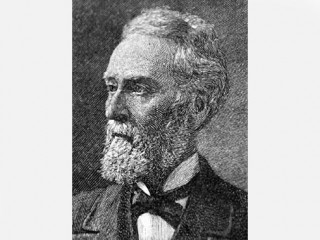
Medill Joseph biography
Date of birth : 1823-04-06
Date of death : 1899-03-16
Birthplace : New Brunswick, Canada
Nationality : Canadian
Category : Famous Figures
Last modified : 2010-06-04
Credited as : Writer and editor, Abraham Lincoln,
0 votes so far
Medill, Joseph (Apr. 6, 1823 - Mar. 16, 1899), journalist, was born in a village near St. John in the province of New Brunswick, Canada. He was of Scotch-Irish stock, and for generations his ancestors had been shipbuilders in Belfast. His father, William Medill, emigrated to America in 1819 and settled in an area that was later awarded to Canada by the Webster-Ashburton treaty of 1842. When he was nine his parents moved to Stark County, Ohio, and there he worked on the farm and received such education as the district schools and an academy in Massillon afforded. Upon reaching the age of twenty-one, he determined to enter a law office and after several years of study was admitted to the bar in 1846; but as law practice was at best uncertain, he turned to journalism. With three younger brothers he purchased the Coshocton Whig in 1849 and immediately renamed it the Republican. Within two years he moved to Cleveland and established the Daily Forest City. A year later he consolidated it with a Free-Soil journal and established the Cleveland Leader. Accepting the election of 1852 as foreshadowing the end of the Whig party, he labored diligently for the organization of a new party to be called Republican. In March 1854 a secret meeting was held in the office of the Cleveland Leader and plans adopted for the new anti-slavery party. There is evidence to show that he was the first man to advocate the name Republican even before the Kansas-Nebraska bill was passed (A. J. Turner, "Genesis of the Republican Party," Wisconsin State Register, Mar. 1898; Cleveland, post, p. 85).
In the winter of 1854-55 he visited Chicago and with Dr. Charles Ray bought an interest in the Chicago Tribune, which was experiencing financial difficulties. He was at that time thirty-two years of age and fired with enthusiasm for the Republican party and the cause of freedom. In the campaign of 1856 he played an important part in the welding of discontented political groups into a compact Republican party and during the Lincoln-Douglas debates threw the resources of his paper behind the Republican candidate. He was a close friend of Abraham Lincoln, and more than once Lincoln conferred with him in the office of the Tribune. Although at first in favor of Salmon P. Chase, he soon arrived at the conclusion that Lincoln was the most available candidate and urged him on that ground. He always told with pleasure how he urged Carter of Ohio to change several votes to Lincoln in the Chicago convention, with the result that a landslide was started in favor of the Illinois candidate (Cleveland, post, p. 85). At the outbreak of the Civil War, he was opposed to any compromise with the South and at all times demanded an active prosecution of the war. Taking his stand in favor of emancipation and confiscation of southern property, he continually urged the administration to adopt a more radical course of action. He was among the first to advocate the arming of the slaves and insisted from the beginning of the conflict that the soldier in the field should not lose his right to vote. It was largely due to his efforts that several states in the Northwest passed laws to that effect in 1864 (Chicago Tribune, Jan. 8, 21, Feb. 4, 1864; Graphic, Dec. 19, 1891; Andreas, post, vol. II, p. 51). He was also one of the organizers of the powerful and influential Union defense committee, which became the mainstay of the government during the uncertain days of civil strife. In the reconstruction of the South following the war, he supported Congress and was heartily in favor of the radical policies of the Republican party.
He was elected to the Illinois constitutional assembly in 1869, and was the chairman of the committee on electoral and representative reform that wrote the minority-representation clause (Debates and Proceedings of the Constitutional Convention ... Ill.... 1869, 1870, vol. I, pp. 560-61). He served as one of the first civil-service commissioners under President Grant. Following the great fire which swept over Chicago in 1871, he was elected mayor and during his term of office labored diligently to remove the municipal government from politics. He greatly enhanced the appointive and removal power of the city administration. In 1874 he bought a majority of the stock of the Tribune company and during the remainder of his life controlled the policy of his paper. He had able colleagues, but it was he who gave the paper its impetus and direction. Until the day of his death he was actively in charge of the paper. While in San Antonio, Tex., he was taken ill with heart disease and died at the age of seventy-six. The day before his death he had written a short editorial, which appeared in the same issue of the Tribune that carried the news of his death. His last words were, "What is the news?" (Chicago Tribune, Mar. 17, 1899). He was married on Sept. 2, 1852, to Katharine Patrick, the daughter of James Patrick of New Philadelphia, Ohio. During the Civil War she took part in the labors of the sanitary commission and was active in all phases of war work. There were three children.
















